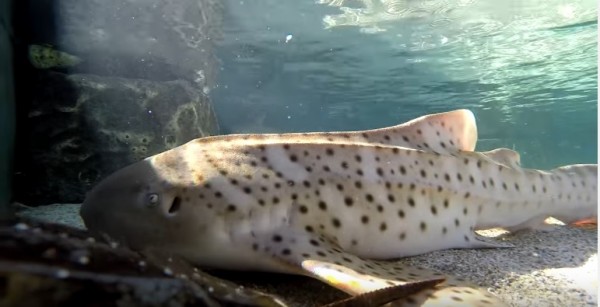By Charissa Echavez, | January 19, 2017

Zebra Sharks
A female zebra shark in an Australian aquarium surprised researchers after it gave birth to an offspring asexually.
Even though scientists have already witnessed "virgin births" from other vertebrates, this is the first time they observed a female shark reproducing asexually after it had previously mated with a male.
Like Us on Facebook
The Zebra shark named Leonie is by far the third vertebrae documented that is capable of switching its reproductive strategy sexually to asexually. The other two are the eagle ray and a boa constrictor.
Leonie used to live with a male partner at the Reef HQ aquarium in Townsville, Queensland, from 2006 to 2012. To scale back the breeding program, the zebra shark was moved to a different tank. The pair had several litters before being separated.
Leonie, together with a female pup of hers named Lolly, were moved to the same tank, CNN reported. Two years after separation from the male sharks, both sharks laid eggs, although none of these hatched. The following year, both zebra sharks laid eggs again. And this time around, three of Leonie's eggs and two of Lolly's emerged into live hatchlings.
Although this came at a surprise for researchers, Christine Dudgeon, a biologist from the University of Queensland, pointed two possibilities for the eggs hatching.
"One was sperm storage... Sharks have been known to store sperm from male sharks for extended periods of time. The other was parthenogenesis [asexual reproduction]. This has been seen in a handful of sharks, but none that had mated previously," she said.
Interestingly, the genetics analysis of the hatchlings revealed an elevated homozygosity, which means that more genes appeared to be identical rather than diverse, suggesting that they had been produced asexually instead of sexually via sperm storage.
Dudgeon explained that the zebra shark had possibly carried out a "holding-on mechanism," wherein female genes are passed from female to female until males are available to mate with. However, she noted that over time, animals' genetic diversity is greatly reduce. "Long term, they need to diversify to help them adapt to their environment."
-
Use of Coronavirus Pandemic Drones Raises Privacy Concerns: Drones Spread Fear, Local Officials Say

-
Coronavirus Hampers The Delivery Of Lockheed Martin F-35 Stealth Fighters For 2020

-
Instagram Speeds Up Plans to Add Account Memorialization Feature Due to COVID-19 Deaths

-
NASA: Perseverance Plans to Bring 'Mars Rock' to Earth in 2031

-
600 Dead And 3,000 In The Hospital as Iranians Believed Drinking High-Concentrations of Alcohol Can Cure The Coronavirus

-
600 Dead And 3,000 In The Hospital as Iranians Believed Drinking High-Concentrations of Alcohol Can Cure The Coronavirus

-
COVID-19: Doctors, Nurses Use Virtual Reality to Learn New Skills in Treating Coronavirus Patients











